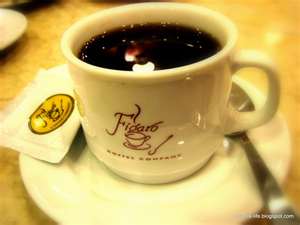“The purpose of life
is a life of purpose.”---Robert Byrne
This Filipino enterprise serving the famed barako blend of coffee
has come a long way since its modest beginnings in 1993 as an unfussy coffee
shop. Today, after becoming a full service store that offers a whole range of
fast food items, and going into franchise operations, the company has established16
franchisees, and 14 company owned stores throughout the country. It’s a
profitable business that continues to grow.
The Small Business Corporation, by way of its Franchise
financing facility has financed the establishment of several Figaro coffee
stores, and has helped in the growth of the business.
But more than just its business success, what makes Figaro
Coffee Company unique among its SME peers is fulfilling a purpose--- to revive
the once vibrant and now struggling coffee industry.
It is one of the leading movers in an effort to bring back
to the industry its old position of prominence in the world coffee market. Representing
the private sector as one of the leading coffee retailers in the country,
Figaro Coffee Company has built on the image as a source of Filipino specialty
coffee. It introduced Barako roast in
1999 and it immediately became a big success.
Believing in the potential of the Barako bean, Pacita Juan,
owner of Figaro embarked on a program called “Save the Barako.” The program
promoted the coffee bean, and encouraged farmers to plant and improved their
cultural practices to increase productivity.
At the same time, Juan also set up the Figaro Foundation Corporation to
address the plight of the coffee farmers and the other humanitarian needs of
the industry.
Soon the business promotion effort became an industry saving
cause. Figaro became active in launching various projects such as tree
planting, coffee farm tours, art exhibits, coffee conventions, seminars, and
trainings in quick succession, all in the call of reviving the coffee industry.
With its use of the mass media, Figaro soon made people
aware of the low productivity of the Barako coffee due to the low demand, and
because of this awareness, people soon started buying the local coffee which
increased the demand among domestic and foreign coffee retailers.
Figaro’s involvement eventually became institutionalized as
its owner was selected as private sector representative and co-chair of the
National Coffee Development Board, a government created, but private sector led
collaborative effort to bring back the Philippine coffee industry on its feet.
Since then, there has been an air of optimism as industry
players look to the future. As one industry stalwart puts it, “its bean value
is at least three billion pesos. It’s growing by leaps and bounds and there’s
room for investment, not only in retail but also in farming.”
Figaro has truly epitomized the devotion of the entrepreneur
to its art, or to the purpose to which the enterprise was created. As industry
analysts sum it up, it’s an inspired effort to “secure the future of a dying
coffee bean.” In the process, not only Figaro has reaped the benefits, but the
Filipino and the country as well.


No comments:
Post a Comment